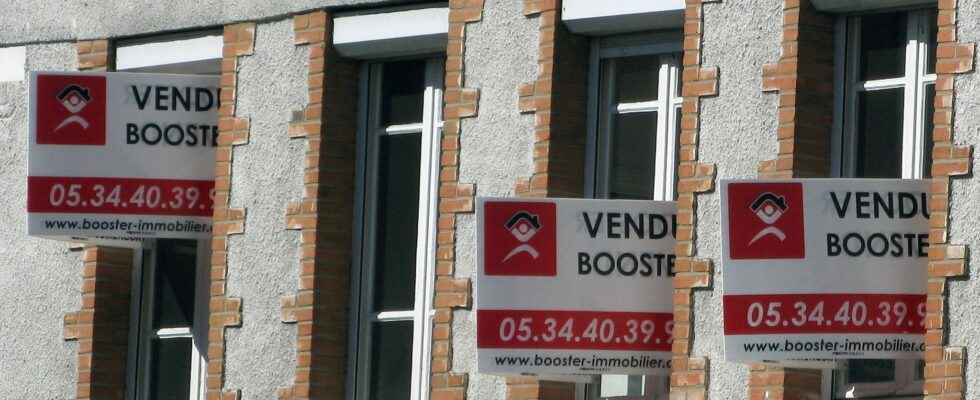Real estate prices are falling and buyers are in a position of strength to negotiate lower prices. Here are two “preconceived ideas” demolished by Guy Hoquet l’Immobilier. In January 2023, purchase prices were negotiated down by 4.61% on average, almost as much as in January 2022 (-4.74%), according to a study conducted by the Guy network Hiccups with its 550 real estate agencies.
Similarly, according to the Guy Hoquet l’Immobilier barometer, which assesses all of the 3.3 million properties put up for sale in the old buildings by the biggest players in the real estate market, prices have increased by 4.5 % nationally in January 2023. Nevertheless, several regions are seeing falling prices: Auvergne-Rhône-Alpes, Ile-de-France, Nouvelle-Aquitaine and Paca.
“There is no big price sale”, comments to L’Express Séverine Amate, spokesperson for Guy Hoquet l’Immobilier. “But that doesn’t mean prices won’t go down in the future, maybe there will be a turnaround,” she adds. “I have not felt a significant drop in prices. In my opinion, we are still in the in-between phase, perhaps at the top of the curve with stagnation”, abounds with L’Express Jean-Baptiste Bullet , spokesperson for the notaries of Greater Paris.
Sellers “remain in a position of strength”
According to the study conducted by Guy Hiccups with its franchisees, houses are negotiated more than apartments: prices are revised downwards by 5.31% for houses against 3.98% for apartments. For Séverine Amate, this difference is probably explained by the surge in energy prices “which comes to strain the household budget”, even if the purchase of a house remains “the first choice” of buyers.
In this context marked by prices which have not yet fallen significantly, buyers are therefore not in a position to impose their demands at the time of negotiation. “The sellers remain in a position of strength and stick to their position”, underlines Séverine Amate. The bargaining power of buyers does not exist.” “I do not feel that the ball is still in the court of buyers, also believes Jean-Baptiste Bullet. I think everyone is in an observation phase right now.”
“I do not have the feeling that the relationship has reversed, also confirms Cécile Roquelaure, director of studies at the broker Empruntis, questioned by the JDD. It is in particular the second buyers who keep control and wait for the right offer before selling and buying another property.” “In 60% of cases, sellers have a double hat: that of selling and then buying another property behind” , abounds Séverine Amate.
Most of the time, these “comfort sellers”, as opposed to “emergency sellers”, forced to part with their accommodation quickly due to the vagaries of life, “are not in a hurry” to sell their apartment or house , notes the spokesperson for Guy Hiccups. As for the buyers, “they put their project under a glass” while waiting for more favorable days.
“Many buyers are waiting for prices to drop,” notes L’Express Aurélien Muhlhauser. The real estate advisor at IAD France in Aube notes that buyers “are a little more cautious”. In this context of uncertainty, “the projects do not necessarily materialize and the goods remain a little longer on the market”, he observes. As noted by AFP, according to the Century 21 France agency network, the time between the publication of an ad and the signing of a sales agreement has increased by two days for houses and six days for apartments in Ile-de-France.
An ever-decreasing number of buyers?
If sellers are still in control for the time being, the trend could be reversed in the coming months. Professionals in the real estate sector fear that the regulations on thermal sieves will bring down the price of the housing concerned.
Since January 1, 2023, in mainland France, housing that consumes more than 450 kilowatt hours per square meter per year is prohibited from being rented. All goods labeled G for their energy performance must follow in 2025, before F in 2028 and E in 2034.
Above all, interest rates have been rising since the spring of 2022. This increase, combined with the regulations on the usury rate, which prohibits banks from lending beyond a certain debt ratio, could have consequences on transactions, by reducing the number of buyers. If the supply of goods for sale remains constant and demand decreases, sellers may be pressured to lower their price in order to sell successfully.
“A year ago, sellers were not ready to negotiate”
The number of loans granted to individuals wishing to acquire a home has already dropped drastically in 2022, under the effect of the rise in borrowing rates, as revealed on January 17 by the CSA/Crédit Logement observatory. Over the whole of 2022, the number of loans granted fell by 20.5% compared to 2021. “Many buyers fall by the wayside because they cannot finance a property”, notes Séverine Amate.
Sellers may therefore have to adapt to new real estate market conditions. But will they integrate this new reality? “I hear less and less about purchase proposals at the price asked by the seller, so there are now a little more negotiations, observes Aurélien Muhlhauser. Sellers try to part with their homes at high prices while knowing that there will be a negotiation, whereas a year ago, they were not ready to negotiate.
Aurélien Muhlhauser warns sellers who are too greedy, whose value of their apartment or their house would be too high: “People who do not sell at the current market price will potentially have a loss in value in the months to come because of other goods will arrive at market price.” Enough to encourage them to make the fairest estimate of the price from the outset, plead professionals in the real estate sector… who preach (logically) for their parish.
